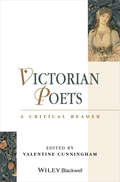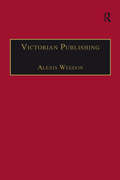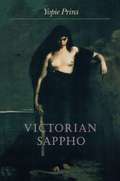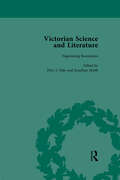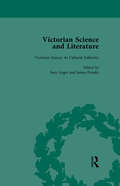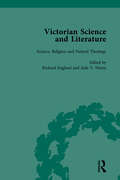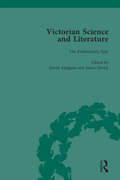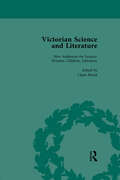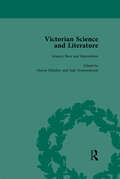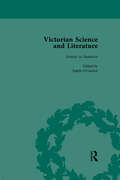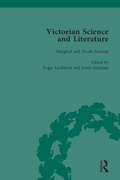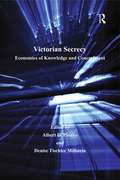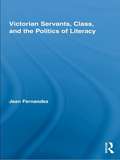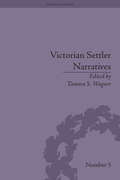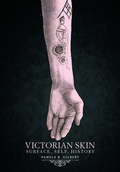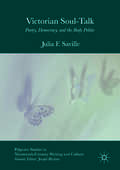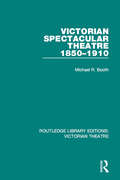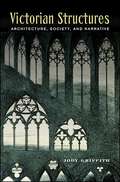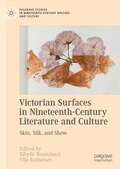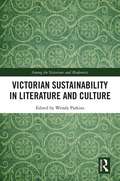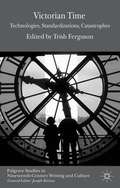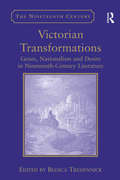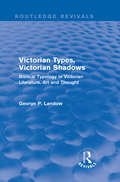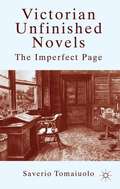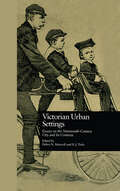- Table View
- List View
Victorian Poets: A Critical Reader (Blackwell Critical Reader #9)
by Valentine CunninghamVictorian Poets: A Critical Reader features a collection of critical essays focusing on various aspects of Victorian-era poetry from the 1830s to the 1890s. Presents key criticism on Victorian poetry Features contributions from a variety of scholars in the field Illustrates the full range of critical approaches to the Victorian poets, including attention to texts, words, forms, modes, and sub-genres Offers fresh reinterpretations, many driven by contemporary ideological interests, including gender questions, selfhood, and body issues
Victorian Publishing: The Economics of Book Production for a Mass Market 1836-1916 (The Nineteenth Century Series)
by Alexis WeedonDrawing on research into the book-production records of twelve publishers-including George Bell & Son, Richard Bentley, William Blackwood, Chatto & Windus, Oliver & Boyd, Macmillan, and the book printers William Clowes and T&A Constable - taken at ten-year intervals from 1836 to 1916, this book interprets broad trends in the growth and diversity of book publishing in Victorian Britain. Chapters explore the significance of the export trade to the colonies and the rising importance of towns outside London as centres of publishing; the influence of technological change in increasing the variety and quantity of books; and how the business practice of literary publishing developed to expand the market for British and American authors. The book takes examples from the purchase and sale of popular fiction by Ouida, Mrs. Wood, Mrs. Ewing, and canonical authors such as George Eliot, Wilkie Collins, and Mark Twain. Consideration of the unique demands of the educational market complements the focus on fiction, as readers, arithmetic books, music, geography, science textbooks, and Greek and Latin classics became a staple for an increasing number of publishing houses wishing to spread the risk of novel publication.
Victorian Sappho
by Yopie PrinsWhat is Sappho, except a name? Although the Greek archaic lyrics attributed to Sappho of Lesbos survive only in fragments, she has been invoked for many centuries as the original woman poet, singing at the origins of a Western lyric tradition. Victorian Sappho traces the emergence of this idealized feminine figure through reconstructions of the Sapphic fragments in late-nineteenth-century England. Yopie Prins argues that the Victorian period is a critical turning point in the history of Sappho's reception; what we now call "Sappho" is in many ways an artifact of Victorian poetics. Prins reads the Sapphic fragments in Greek alongside various English translations and imitations, considering a wide range of Victorian poets--male and female, famous and forgotten--who signed their poetry in the name of Sappho. By "declining" the name in each chapter, the book presents a theoretical argument about the Sapphic signature, as well as a historical account of its implications in Victorian England. Prins explores the relations between classical philology and Victorian poetics, the tropes of lesbian writing, the aesthetics of meter, and nineteenth-century personifications of the "Poetess." as current scholarship on Sappho and her afterlife. Offering a history and theory of lyric as a gendered literary form, the book is an exciting and original contribution to Victorian studies, classical studies, comparative literature, and women's studies.
Victorian Science and Literature, Part I Vol 1
by Jonathan Smith Bernard Lightman Gowan Dawson James Paradis Suzy Anger David Amigoni Richard England James Elwick Piers J Hale Jude V NixonThis eight-volume, reset edition in two parts collects rare primary sources on Victorian science, literature and culture. The sources cover both scientific writing that has an aesthetic component – what might be called 'the literature of science' – and more overtly literary texts that deal with scientific matters.
Victorian Science and Literature, Part I Vol 2
by Jonathan Smith Bernard Lightman Gowan Dawson James Paradis Suzy Anger David Amigoni Richard England James Elwick Piers J Hale Jude V NixonThis eight-volume, reset edition in two parts collects rare primary sources on Victorian science, literature and culture. The sources cover both scientific writing that has an aesthetic component – what might be called 'the literature of science' – and more overtly literary texts that deal with scientific matters.
Victorian Science and Literature, Part I Vol 3
by Jonathan Smith Bernard Lightman Gowan Dawson James Paradis Suzy Anger David Amigoni Richard England James Elwick Piers J Hale Jude V NixonThis eight-volume, reset edition in two parts collects rare primary sources on Victorian science, literature and culture. The sources cover both scientific writing that has an aesthetic component – what might be called 'the literature of science' – and more overtly literary texts that deal with scientific matters.
Victorian Science and Literature, Part I Vol 4
by Jonathan Smith Bernard Lightman Gowan Dawson James Paradis Suzy Anger David Amigoni Richard England James Elwick Piers J Hale Jude V NixonThis eight-volume, reset edition in two parts collects rare primary sources on Victorian science, literature and culture. The sources cover both scientific writing that has an aesthetic component – what might be called 'the literature of science' – and more overtly literary texts that deal with scientific matters.
Victorian Science and Literature, Part II vol 5
by Bernard Lightman Marwa Elshakry Sujit Sivasundaram Gowan Dawson Claire Brock Roger Luckhurst Ralph O'Connor Justin SausmanThis eight-volume, reset edition in two parts collects rare primary sources on Victorian science, literature and culture. The sources cover both scientific writing that has an aesthetic component – what might be called 'the literature of science' – and more overtly literary texts that deal with scientific matters.
Victorian Science and Literature, Part II vol 6
by Bernard Lightman Marwa Elshakry Sujit Sivasundaram Gowan Dawson Claire Brock Roger Luckhurst Ralph O'Connor Justin SausmanThis eight-volume, reset edition in two parts collects rare primary sources on Victorian science, literature and culture. The sources cover both scientific writing that has an aesthetic component – what might be called 'the literature of science' – and more overtly literary texts that deal with scientific matters.
Victorian Science and Literature, Part II vol 7
by Bernard Lightman Marwa Elshakry Sujit Sivasundaram Gowan Dawson Claire Brock Roger Luckhurst Ralph O'Connor Justin SausmanThis eight-volume, reset edition in two parts collects rare primary sources on Victorian science, literature and culture. The sources cover both scientific writing that has an aesthetic component – what might be called 'the literature of science' – and more overtly literary texts that deal with scientific matters.
Victorian Science and Literature, Part II vol 8
by Bernard Lightman Marwa Elshakry Sujit Sivasundaram Gowan Dawson Claire Brock Roger Luckhurst Ralph O'Connor Justin SausmanThis eight-volume, reset edition in two parts collects rare primary sources on Victorian science, literature and culture. The sources cover both scientific writing that has an aesthetic component – what might be called 'the literature of science' – and more overtly literary texts that deal with scientific matters.
Victorian Secrecy: Economies of Knowledge and Concealment
by Denise Tischler MillsteinWhether commercial, personal, political, professional, or spiritual, knowledge was capital for the Victorians in their ongoing project of constructing a modern information-based society. Victorian Secrecy explores the myriad ways in which knowledge was both zealously accumulated and jealously guarded by individuals, institutions, and government entities in Victorian Britain. Offering a wide variety of critical approaches and disciplinary perspectives, the contributors examine secretive actors with respect to a broad range of subjects, including the narrator in Tess of the d'Urbervilles, John Henry Newman's autobiographical novel Loss and Gain, Richard Dadd's The Fairy Feller's Masterstroke, modes of detection in Bleak House, the secret history of Harriet Martineau's role in the repeal of the Corn Law, and Victorian stage magicians. Taken together, the essays provide a richly textured account of which modes of hiding and revealing articulate secrets in Victorian literature and culture; how social relations are formed and reformed in relationship to secrecy; and what was at stake individually, aesthetically, and culturally in the Victorians' clandestine activities.
Victorian Servants, Class, and the Politics of Literacy (Routledge Studies in Nineteenth Century Literature)
by Jean FernandezIn this volume, Fernandez brings the under-examined figure of the Victorian servant out of obscurity in order to tell the story of his or her encounter with literacy, as imagined and represented in nineteenth-century fiction, autobiography, pamphlets and diaries. A vast body of writing is uncovered on the management of servant literacy in Victorian periodicals, advice manuals, cartoons, sermons, books on household management, and pornography, thereby revealing that the domestic sphere was a crucial war zone in the battle over mass literacy. By attending to how fictional and nonfictional texts of the age feature literate servant narrators, she demonstrates how the issue of servant literacy as a cultural phenomenon has profound implications for our understanding of the nexus between class, mass literacy, voice and narrative power in the nineteenth century. The study reads canonical fiction by Mary Wollstonecraft, Emily Bronte, Elizabeth Gaskell, Wilkie Collins, and R.L. Stevenson alongside popular detective fiction by Catherine Crowe, the Diaries of Hannah Cullwick, and best-selling pamphlets of the age, while introducing to Victorian scholarship hitherto little known or unknown servant autobiographies that address life history as an engagement with literacy.
Victorian Settler Narratives: Emigrants, Cosmopolitans and Returnees in Nineteenth-Century Literature (Gender and Genre #5)
by Tamara S. WagnerThis edited collection from a distinguished group of contributors explores a range of topics including literature as imperialist propaganda, the representation of the colonies in British literature, the emergence of literary culture in the colonies and the creation of new gender roles such as ‘girl Crusoes’ in works of fiction.
Victorian Skin: Surface, Self, History
by Pamela K. GilbertIn Victorian Skin, Pamela K. Gilbert uses literary, philosophical, medical, and scientific discourses about skin to trace the development of a broader discussion of what it meant to be human in the nineteenth century. Where is subjectivity located? How do we communicate with and understand each other's feelings? How does our surface, which contains us and presents us to others, function and what does it signify? As Gilbert shows, for Victorians, the skin was a text to be read. Nineteenth-century scientific and philosophical perspectives had reconfigured the purpose and meaning of this organ as more than a wrapping and instead a membrane integral to the generation of the self. Victorian writers embraced this complex perspective on skin even as sanitary writings focused on the surface of the body as a dangerous point of contact between self and others. Drawing on novels and stories by Dickens, Collins, Hardy, and Wilde, among others, along with their French contemporaries and precursors among the eighteenth-century Scottish thinkers and German idealists, Gilbert examines the understandings and representations of skin in four categories: as a surface for the sensing and expressive self; as a permeable boundary; as an alienable substance; and as the site of inherent and inscribed properties. At the same time, Gilbert connects the ways in which Victorians "read" skin to the way in which Victorian readers (and subsequent literary critics) read works of literature and historical events (especially the French Revolution.) From blushing and flaying to scarring and tattooing, Victorian Skin tracks the fraught relationship between ourselves and our skin.
Victorian Soul-Talk
by Julia F. SavilleThis book explores the decades between the Reform Acts of 1832 and 1884 when British poets such as Elizabeth Barrett Browning, Arthur Hugh Clough, Robert Browning, and Algernon Charles Swinburne, along with their transatlantic contemporary Walt Whitman, defended the civil rights of disenfranchised souls as Western nations slowly evolved toward modern democracies with shared transnational connections. For in the decades before the new science of psychology transformed the soul into the psyche, poets claimed the spiritual well-being of the body politic as their special moral responsibility. Exploiting the rich aesthetic potential of language, they created poetry with striking sensory appeal to make their readers experience the complex effects of political decisions on public spirit. Within contexts such as Risorgimento Italy, Civil War America, and Second Empire France, these poets spoke from their souls to the souls of their readers to reveal insights that eluded the prosaic forms of fiction, essay, and journalism.
Victorian Spectacular Theatre 1850-1910 (Routledge Library Editions: Victorian Theatre #3)
by Michael R. BoothOriginally published in 1981. This study concentrates on one aspect of Victorian theatre production in the second half of the nineteenth century – the spectacular, which came to dominate certain kinds of production during that period. A remarkably consistent style, it was used for a variety of dramatic forms, although surrounded by critical controversy. The book considers the theories and practice of spectacle production as well as the cultural and artistic movements that created the favourable conditions in which spectacle could dominate such large areas of theatre for so many years. It also discusses the growth of spectacle and the taste of the public for it, examining the influence of painting, archaeology, history, and the trend towards realism in stage production. An explanation of the working of spectacle in Shakespeare, pantomime and melodrama is followed by detailed reconstructions of the spectacle productions of Irving’s Faust and Beerbohm Tree’s King Henry VIII.
Victorian Structures: Architecture, Society, and Narrative (SUNY series, Studies in the Long Nineteenth Century)
by Jody GriffithAlthough Victorian novels often feature lengthy descriptions of the buildings where characters live, work, and pray, we may not always notice the stories these buildings tell. But when we do pay attention, we find these buildings offer more than evocative background settings. Victorian Structures uses the architectural writings of Victorian critic John Ruskin as a framework for examining the interaction of physical, social, and narrative structures in Little Dorrit by Charles Dickens, Adam Bede by George Eliot, and The Mayor of Casterbridge and Jude the Obscure by Thomas Hardy. By closely reading their descriptions of architectural structure, this book reconsiders structure itself—both the social structures the novels reflect, and the narrative structures they employ. Weaving together analysis of these three kinds of structure offers an interpretation of Victorian realism that is far more socially and formally unstable than critics have tended to assume. It illustrates how these novels radically critique the limitations, dysfunctions, and deceptions of structure, while also imagining alternative possibilities.This unique interdisciplinary approach emphasizes structure-in-time: while current conversations about structure focus on its static and fixed properties, this book understands it as various forces in tension, producing meanings that are always in flux. Victorian Structures focuses not only on the way structures shape our perceptions and experiences, but also, more importantly, on the processes through which those structures come to be constructed in the first place, and how they change over time.
Victorian Surfaces in Nineteenth-Century Literature and Culture: Skin, Silk, and Show (Palgrave Studies in Nineteenth-Century Writing and Culture)
by Sibylle Baumbach Ulla RatheiserThis volume explores the politics and poetics of Victorian surfaces in their manifold manifestations. In so doing, it examines various cultural products ‘as they are’ and highlights the art of surface composition in the Victorian era as well as the socio-cultural ramifications of the preoccupation with the exterior. By closely reading the various surfaces materialising in Victorian literature and culture, the individual contributions explore the dialectics of surface and depth in Victorian (and Neo-Victorian) cultures as well as the legibility of surfaces. They look into the surfaces of literary narratives, paintings, and film but also into natural surfaces such as skin or bark. Each chapter foregrounds what is present rather than absent in a text, while also paying attention to the surfaces that become manifest on the diegetic level of the text, be they cloth, landscapes, or human bodies or faces.This is an open access book.
Victorian Sustainability in Literature and Culture (Among the Victorians and Modernists)
by Wendy ParkinsFrom a growing awareness of the depletion of energy resources and the perils of environmental degradation to the founding of self-sufficient communities and the establishment of the National Trust, the concept of sustainability began to take on a new importance in the Victorian period. An emerging sense of the fragility and instability of human and natural resources, and the deeply complex interweaving of the two, led many Victorians to consider how to preserve or protect what they valued, and how individuals, communities (or even nations) could survive and flourish in a world of finite resources. This collection explores not only nascent understandings of sustainability in ecological or environmental contexts but also encompasses consideration of the problem of psychological sustainability and emotional wellbeing in response to the upheavals of modernity. With chapters by scholars working in literary studies, history, cultural studies, and sustainability studies, the volume encompasses a wide diversity of topics, objects, and authors ranging from the 1850s to the early twentieth century. Victorian Sustainability offers new perspectives on debates about sustainability in the present by showing how our current concerns derive from an earlier historical context.
Victorian Time
by Trish FergusonVictorian Time examines how literature of the era registers the psychological impact of the onset of a modern, industrialized experience of time as time-saving technologies, such as steam-powered machinery, aimed at making economic life more efficient, signalling the dawn of a new age of accelerated time.
Victorian Transformations: Genre, Nationalism and Desire in Nineteenth-Century Literature (The\nineteenth Century Ser.)
by Bianca TredennickProposing the concept of transformation as a key to understanding the Victorian period, this collection explores the protean ways in which the nineteenth century conceived of, responded to, and created change. The volume focuses on literature, particularly issues related to genre, nationalism, and desire. For example, the essays suggest that changes in the novel's form correspond with shifting notions of human nature in Victor Hugo's Notre-Dame de Paris; technical forms such as the villanelle and chant royal are crucial bridges between Victorian and Modernist poetics; Victorian theater moves from privileging the text to valuing the spectacles that characterized much of Victorian staging; Carlyle's Past and Present is a rallying cry for replacing the static and fractured language of the past with a national language deep in shared meaning; Dante Gabriel Rossetti posits unachieved desire as the means of rescuing the subject from the institutional forces that threaten to close down and subsume him; and the return of Adelaide Anne Procter's fallen nun to the convent in "A Legend of Provence" can be read as signaling a more modern definition of gender and sexuality that allows for the possibility of transgressive desire within society. The collection concludes with an essay that shows neo-Victorian authors like John Fowles and A. S. Byatt contending with the Victorian preoccupations with gender and sexuality.
Victorian Types, Victorian Shadows: Biblical Typology in Victorian Literature, Art and Thought (Routledge Revivals)
by George P. LandowThe importance of typology in the study of early modern literature has long been accepted, yet students of Victorian culture have paid little attention to it. First published in 1980, this study demonstrates how biblical typology, an apparently arcane interpretative mode, had profound effects on the secular culture of the Victorian age: its art, literature and thought. George Landow considers the way in which the average English believer learned to read their Bible in terms of the types and shadows of Christ, the various ways in which Victorian poetry and hymns employed certain imagery, and the use of typological symbolism in narrative poetry, prose fiction, dramatic monologue and non-fiction. In a concluding chapter, he investigates the particularly complex, and often ironic, combinations of typological image and typological structure.
Victorian Unfinished Novels
by Saverio TomaiuoloThe first detailed study on the subject of Victorian unfinished novels, this book explores the notion of incompleteness in major novelists such as Charlotte Bronte, Elizabeth Gaskell, W. M. Thackeray, Charles Dickens, R. L. Stevenson, Anthony Trollope, Wilkie Collins and Henry James. The aim of this book is to shed further light on novels that have been neglected by critical studies (Thackeray's Denis Duval, Stevenson's St. Ives, Trollope's The Landleaguers, and Wilkie Collins's Blind Love), and to focus in a new way on critically acclaimed masterpieces (Dickens's The Mystery of Edwin Drood, Gaskell's Wives and Daughters and Stevenson's Weir of Hermiston). The incomplete nature of these texts has sometimes prevented literary critics from approaching them as the last important narrative testimonies on topics cogently related to Victorian culture, such as the question of moral corruption, the crisis of old narrative forms, the changing roles of ladies and gentlemen in society, the necessity of idealism in an 'age of incredulity' and the incongruities of imperial politics. This book thus offers a counter-reading of the nineteenth-century literary canon through the perspective offered by the issue of 'unending'. Using extensive quotations from primary texts, and applying an engaging and lively close analysis, Victorian Unfinished Novels: The Imperfect Page also raises thought-provoking questions on the alleged impossibility of a closed narrative ending, and on the idea of literary creation at large. "
Victorian Urban Settings: Essays on the Nineteenth-Century City and Its Contexts (Literature and Society in Victorian Britain #Vol. 1)
by Debra N. Mancoff D. J. TrelaFirst published in 1996. Routledge is an imprint of Taylor & Francis, an informa company.
